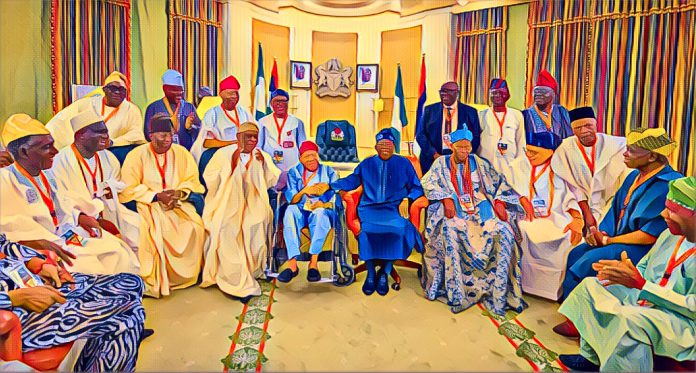In a crucial meeting held at the Presidential Villa in Abuja, leaders from the respected pan-Yoruba socio-cultural organization, Afenifere, led by Reuben Fasoranti, engaged with President Bola Ahmed Tinubu to discuss a series of transformative demands aimed at fostering regional and national development. This encounter underscores a significant moment in Nigeria’s political landscape as it brings to the forefront issues of restructuring, security, and regional development, particularly in the South-West.
Afenifere’s delegation to President Tinubu, the first member of their organization to become President of Nigeria, highlighted a positive view of his early tenure. Fasoranti praised Tinubu’s efforts at altering the national narrative and emphasized the need for swift action on Afenifere’s proposals, which are seen as crucial for Nigeria’s advancement. The group’s commendation of Tinubu’s leadership underscored their hope that his presidency would be a turning point for the country, driving it toward a position of greatness with a legacy of effective governance.
Among the key topics discussed was the restructuring of the Nigerian federation, a longstanding pillar of Afenifere’s agenda. The organization argues that a reorganized governance structure would better reflect the country’s diverse socio-economic realities, ensuring a more equitable distribution of resources and more effective local governance. This would involve constitutional amendments and policy adjustments to decentralize power and give more autonomy to the states, enhancing their ability to address local needs effectively.
Infrastructure development, particularly in the South-West, was also a major point of discussion. Afenifere pressed for the construction and rehabilitation of major road networks which are vital for economic activities and connectivity within the region. This, they believe, would significantly boost economic development and ease the movement of goods and people.
Security issues, specifically the rising incidents of banditry and kidnapping, were highlighted as urgent concerns. Afenifere urged the President to intensify efforts in combating these security challenges, which pose a significant threat to the peace and stability of the nation.
Additionally, the leaders requested the elevation of the Federal College of Agriculture in Kabba, Kogi State, to a university status. They argued that such an upgrade would provide higher educational opportunities in the region and foster specialized knowledge in agriculture, which is pivotal for the country’s development.
In his response, President Tinubu expressed emotional gratitude for the visit, affirming his commitment to restructuring Nigeria and enhancing governance to ensure equitable benefits for all citizens. He reassured the delegation of his dedication to addressing the federation’s structural challenges and echoed Afenifere’s concerns about improving governance through constitutional democracy.
On security, Tinubu took a firm stance, vowing that his administration would not tolerate any threats to the nation’s sovereignty. He promised robust action against the forces of banditry and kidnapping, aiming to restore security and public confidence.
The meeting was positively received within political and social circles, with Dr. Kunle Olajide, former Secretary-General of the Yoruba Council of Elders, commending the initiative as beneficial for national unity and progress. The discussions were seen as a step forward in bridging government action with grassroots expectations and regional advocacy.
This gathering not only highlights the critical role of influential cultural organizations like Afenifere in national politics but also reflects the complexities and challenges of governing a diverse nation like Nigeria. The outcomes from this meeting may set important precedents for how regional demands are integrated into national policies, potentially shaping the trajectory of Nigeria’s socio-economic development under Tinubu’s administration. As Nigeria moves forward, the effective implementation of these discussed reforms will be key in determining the nation’s success in achieving a more secure, developed, and equitably governed society.



